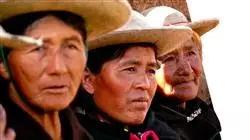University certificate
The world's largest faculty of humanities”
Description
Would you like to become an expert in International Cooperation for the Development of Peoples? Then bet on a program that will provide you with all the resources you need to achieve it in just 12 months”

The world is experiencing real barbarities caused by social, political and cultural difficulties in different countries. War, hunger, inaccessibility to free quality health care, male chauvinism, poverty, natural disasters, etc. There are dozens of causes that increase the inequality gap between developed and underdeveloped environments, places where cooperation and aid are more necessary than ever. For this reason, the actions carried out by entities such as the Red Cross, UNICEF, Save the Children, WWF, etc., in coordination with governmental entities such as the UN, have made it possible to act in depressed areas, contributing to their recovery to the extent possible, as well as to mitigate the effects through the provision of basic resources such as food, clothing and, if necessary, economic contributions.
However, this is a field that requires meticulous and organized work, in order to make the most of every means (whether physical or collaborative), trying to make it reach its destination in the most effective way. And this is precisely the field of action on which this program is focused. TECH presents the professional master’s degree in International Cooperation for the Development of Peoples as an opportunity for all those professionals seeking specialization in the social area for community aid and collaboration. It is a 100% online degree in which professionals can find all the information necessary to carry out the effective design of any collaborative project, its monitoring and evaluation. All this in a sustainable manner and in accordance with current regulations, focusing on the promotion of human rights,
above all else.
For this, you will have 1,500 hours of the best theoretical, practical and additional content designed by a team of experts specialized in different fields such as the International Law, Nursing and Education. Among them is the figure of a guest Director, a leading figure in the field of International Cooperation who will contribute to this educational experience with 10 exclusive Masterclasses in video format, speaking on the different topics that are currently in the spotlight of the Development of Peoples.
You will delve into the challenges of People's Development and the most innovative and effective strategies to address them in the current global context”
This professional master’s degree in International Cooperation for the Development of Peoples contains the most complete and up-to-date program on the market. The most important features include:
- Practical cases presented by experts in International Development Cooperation
- The graphic, schematic and practical contents of the book provide technical and practical information on those disciplines that are essential for professional practice
- Practical exercises where self-assessment can be used to improve learning
- Its special emphasis on innovative methodologies
- Theoretical lessons, questions to the expert, debate forums on controversial topics, and individual reflection assignments
- Content that is accessible from any fixed or portable device with an Internet connection
This professional master’s degree will give you the keys to undertake your own cooperation project for the promotion of the SDGs from multiple social, political and cultural perspectives”
The program’s teaching staff includes professionals in the field who contribute their work experience to this degree as well as renowned specialists from leading societies and prestigious universities.
The multimedia content, developed with the latest educational technology, will provide the professional with situated and contextual learning, i.e., a simulated environment that will provide immersive education programmed to learn in real situations.
This program is designed around Problem-Based Learning, whereby professionals must try to solve the different professional practice situations that arise throughout the program. For this purpose, the students will be assisted by an innovative interactive video system created by renowned and experienced experts.
A program with which you will be able to work on the knowledge of the best cooperation strategies from wherever and whenever you wish thanks to its 100% online modality"

You will learn how international organizations such as the UN, UNICEF or the Red Cross are working and you will be able to delve into their successful strategies for effective aid"
Objectives
Social inequalities caused by armed conflicts, anti-humanitarian policies and natural disasters have serious consequences for disadvantaged populations around the world. For this reason, the objective of this degree is to provide graduates with all the information they need to specialize in the field of International Cooperation, giving them the necessary tools to carry out innovative, effective and rewarding People's Development projects for the victims.

A program whose trump card is solidarity and good judgment to undertake effective, efficient and highly beneficial solidarity actions for the victims of the countless inequalities that exist in the world”
General Objectives
- Provide students with advanced knowledge in International Cooperation, of a specialized nature and based on theoretical and instrumental knowledge that will allow them to acquire and develop the skills and abilities necessary to obtain a qualification as a solidarity professional
- Provide the students with basic knowledge of the cooperation and development process based on the latest advances in policies on the sustainability processes involved in both economic and social aspects
- Improve professional performance and develop strategies of adaptation and resolution to the problems of today's world through scientific research in cooperation and development processes
- Disseminate the basics of the current system and develop the critical and entrepreneurial spirit, necessary to adapt to political changes within the framework of international law
Specific Objectives
Module 1. The Development of Peoples: Introduction and Challenges
- Understand the importance of the development of peoples
- Become aware of the stakeholders involved in development, why and its consequences
- Know and clarify such basic concepts as “poor ” and “impoverished”
- Raise awareness of the world and development situation
- Familiarize the Communication Management with the economic structure of the world
- Manage the concepts of sustainable development, sustainable objectives, etc., meet their goals and objectives
- Know the basic theories of development in its economic, social, cultural and political aspects
Module 2. International Development Cooperation
- Know different methods of research in International Development Cooperation
- Gain knowledge on methodologies for public policy advocacy, social communication, political change, etc
- Know the evolution and status of current debates on development
- Become familiar with the instruments of international Development Cooperation as well as the types of projects and existing NGOs
- Develop skills to work with the main vulnerable subjects involved in Development Cooperation actions and programs
- Understand the international cooperation system and different actors that make it up
Module 3. Design, Monitoring and Assessment of International Development Cooperation Projects
- Know the management cycle of a development project
- Know the techniques, trends and projects of international development cooperation
- Understand the main problems of the different regional and international environments
- Know the different systems, modalities and basic actors of International Development Cooperation
- Know the regional particularities of development and cooperation
Module 4. Education for Human and Sustainable Development
- Carry out actions and programs aimed at raising awareness of certain situations of injustice and changing values to combat them
- Promote the participation of society, especially children and adolescents and entities of the field, for transforming the world
- Create empowerment processes and spaces for active democratic participation for children, aimed at transforming policies and the decision-making model on topics that affect them
- Promote research and reflection on issues related to childhood and development, supporting different proposals to promote human development
- Encourage networking with other entities in the sector to achieve a greater impact in our actions
- Analyze and understand global initiatives to fight poverty
Module 5. Humanitarian Action and International Development Cooperation
- Identify the processes of design, monitoring and assessment of development cooperation actions, so that graduates acjieve a complete understanding of what a cooperation project is
- Develop a global vision on the nature, perspective and objectives of development cooperation actions
- Analyze and assess the sense of the sectoral and geographic priorities of International Development Cooperation
- Identify the strategic axes that guide cooperation policies and actions, fields of action and instruments for their implementation
- Promote debate and analysis on aspects related to the development of cooperation policies and actions and strategies aimed at improving their quality and effectiveness
- Knowledge of project development methodologies and mastery of technical skills for the identification, formulation, planning, programming, management and monitoring of development cooperation projects
- Delve into the context and nature of humanitarian aid actions
- Assess the process and final result of the different development cooperation projects
Module 6. Human Rights (HR) and International Humanitarian Law (IHL)
- Qualify the different types of armed conflicts by distinguishing them from other situations of armed violence; identify and classify the victims of such conflicts; know and understand the victim protection system and be able to apply it
- Be aware of the limitations that humanitarian law imposes on combatants in relation to the conduct of hostilities, respect for zones, places and installations marked with a protection sign, and the requirement of a code of conduct relating to victims, medical and religious personnel, and humanitarian organizations
- Identify situations and persons who are particularly vulnerable in armed conflicts, knowing the protection afforded to them by International Humanitarian Law
- Stimulate the participation of the people and groups with whom cooperation activities are developed, enabling them to identify their problems and needs, lead their processes of change, assess their evolution and decide on new courses of action
Module 7. Social and Transformative Communication
- Prepare social communicators who can apply their knowledge at the different levels
- Identify, understand and know how to use sources, statistical techniques and computer tools to organize selected information and plan development and cooperation reports, analyses and actions
- Conduct an ethical reflection on cooperation, information, images and their applicability in specific contexts and information sources
Module 8. Equality and Cooperation
- Internalize, analyze and understand what we meant when we talk about gender, development and women's rights
- Know the role of feminist movements in the processes of social advancement and transformation
- Intervene under gender perspectives in international development cooperation
Module 9. Environmental Rights
- Know the interrelationship between all the elements of the environment and how they influence each other
- Recognize the different types of pollution and how they affect the environment
- Analyze the regulations and legislation in force on the subject
- Incorporate the notions of sustainability and environmental and ecological sustainability into cooperation projects and actions in a crosscutting manner
- Understand the link between migration and the development of countries of origin and destination
Module 10. NGDOs and Local, Regional and International Solidarity
- Understand the concepts and definitions of NGOs
- Know the diversity of NGOs and their field or work
- Learn the broad outlines of NGO management
- Identify, understand and know how to use sources and tools to identify international development cooperation projects

Understanding the importance of International Cooperation for the Development of Peoples is the main objective of this program”
Professional Master's Degree in International Cooperation for the Development of Peoples
.
Social, political and cultural difficulties have led to extreme situations such as war, famine, lack of access to quality health care, gender discrimination, poverty and natural disasters. These causes have increased the inequality gap between developed and underdeveloped countries, where cooperation and aid are essential. That is why more and more organizations are working together to provide aid to needy territories, providing essential resources such as food, clothing and economic contributions. In order to achieve a more effective and organized cooperation in this area, TECH has developed the Professional Master's Degree in International Cooperation for the Development of People. This program provides a specialization in this field for those professionals who seek to help the community and collaborate with the development of the neediest countries.
Specialize in International Cooperation for the Development of Peoples online
.
This degree offers a complete and 100% online education for professionals seeking to learn how to design, manage and evaluate collaborative projects in an effective and sustainable way, respecting the current regulations and prioritizing the promotion of Human Rights. Its online mode will enable you to study without the need to move from your home. The Professional Master's Degree in International Cooperation for the Development of People consists of 1,500 hours of theoretical, practical and additional content, developed by a team of high-level experts in different areas, including International Law, Nursing and Education. It is, therefore, an excellent opportunity to develop in a sector that is currently in high demand.







